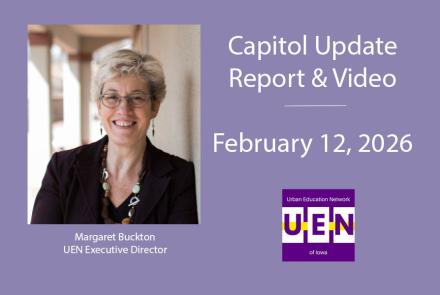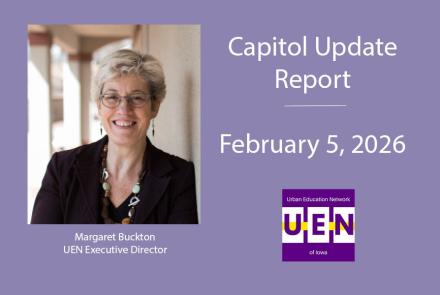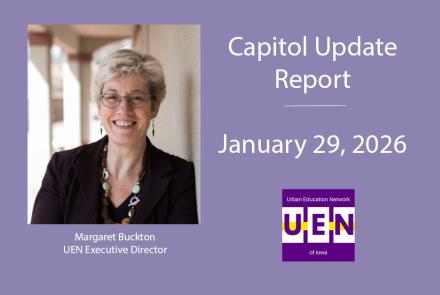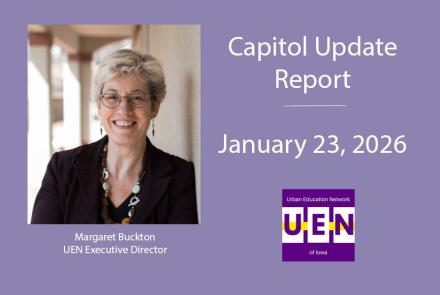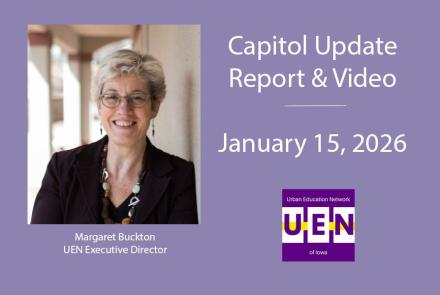Capitol Update - March 24, 2022
UEN Legislative Update
March 24, 2022
Week Eleven of the 2022 Session: Budget bills start moving. Two big bills (Transparency of Instructional Materials and School Mandatory Reporting) changed by amendments, and Gov. Reynolds signs the IPERS Income Limit Increase bill. This UEN Weekly Report from the 2022 Legislative Session includes:
- Governor signs IPERS bill
- Transparency and Civics Significantly Amended in House Appropriations Committee
- Mandatory Reporting bill HF 2567 Amended and Passed by the House
- Public Records Costs SF 2322
- Status of Appropriations Bills
- Education Budget through House Appropriations
- Links to Advocacy Resources
Governor Signs IPERS Bill: Gov. Reynolds signed SF 2266 on March 23. The bill raises the IPERS earnings limit for retirees under age 65 from $30,000 to $50,000. The bill also increases the conflict of interest threshold for school board member earnings from a school district from $6,000 to $20,000. The bill is effective on enactment, so districts could potentially employ folks who had previously reached the prior income limits for the remainder of the school year. UEN is registered in support of this bill.
HF 2577 Transparency and Civics (formerly HF 2499): this bill, which contains the transparency and high stakes social studies test provisions of the Governor’s School Choice bill, HSB 672, was amended in the House Appropriations Committee on March 24. UEN expressed our original concerns with the bill in the UEN Call to Action Governor’s School Choice. As expected, the bill was significantly amended. The amendment accomplishes the following:
- Changes the accreditation statute, that if a district is notified of non-compliance that is not corrected within 30 days, the amendment requires the DE director to recommend and the state board to impose conditions of funding or withhold state or federal funds until the non-compliance is corrected. The amendment then applies this accreditation statute to the new transparency provisions but with a different timeline for transparency corrections, requiring withholding state aid if the non-compliance with these transparency provisions is not corrected within 14 days.
- Allows the school board 14 days after receipt of notice of non-compliance the opportunity to comply (in this case, giving parents access to materials or following process regarding removal of the library book, etc.).
- Requires the DE to assess a civil penalty of $500-$5,000 against the district if the non-compliance is not fixed in 14 days. It also requires the DE to report to BOEE the name of an individual who violated section 279.76.
- Requires charter schools to comply with the transparency provisions (does not apply to nonpublic schools).
- Requires school boards to adopt a policy describing procedures for parents to review the instructional materials used in the student’s classroom.
- Policy must include a way for parents to request their student not be provided with certain materials.
- Policy must be posted on Internet and noticed to parents annually.
- Defines “instructional materials” as either printed or electronic textbooks and related core materials written and published primarily for use in elementary and secondary instruction and required by the DE or school district for use by students in the student’s classes by the teacher of record. (Not lesson plans, not newspaper articles, etc.).
- Requires the district to provide to parents: 1) a course syllabus or written summary of the material that will be taught in a student's class, 2) how the student’s classes meet or exceed the education standards, and 3) list of all instructional materials that will be used (defined above). This requirement may be satisfied by giving the parent view access to the instructional materials through the IMS and must be satisfied this way beginning July 1, 2023.
- If the materials are modified during the year, the district must update the information within 7 days after the modification occurs.
- Library books list must be made available to parents by providing a link to an e-catalogue but if the district doesn't have one, may request waiver from DE. Beginning July 1, 2025, all districts must have an e-catalogue posted.
- District must provide instructions on the district's website of procedures or policies to request reconsideration or removal of a book from the library, including displaying the form used for the request.
- Annually notice to parents how to access instructional materials through the IMS prior to the start of the school year.
- Specifies that a district is not required to reproduce education materials not created by the teacher or distribute any materials that would violate intellectual property rights.
- Requires school boards to have library protocols for selection, review, reconsideration and removal of materials from libraries.
- Includes a process for a parent to request specific library materials not be checked out by their child.
- Requires the protocol to explain lawful and ethical use of information including plagiarism and intellectual property rights.
- Requires prominent display of the process on the district’s website.
- Requires the district to review the request within 14 days (unless district and parent agree to a later time) and notify the parent in writing of the determination.
- Requires the board to act on the district’s recommendation, within 30 days of when the request was received (unless the parent and board agree in writing to a later time).
- Requires the board to notify the parent in writing of their determination.
- Allows the parent to appeal the board’s decision to the state BOE.
- Also allows the parent to appeal the district’s or board’s failure to meet review timelines to the State BOE, which may then direct the school district to perform the review as prescribed (would then kick into the accreditation non-compliance process and subsequent penalties).
- Requires the board to have a document that illustrates the procedure for requesting reconsideration/removal/etc. of the library book.
- Strikes the requirement for the high-stakes civics test for graduation, however,
- The bill still requires districts and nonpublic schools to give the test used by the Immigration and Naturalization Service in granting citizenship as the assessment for US Government unit.
- The bill still requires districts and nonpublic schools to report the results to DE annually.
The bill was approved as amended 14:10, and now moves to the House Calendar. UEN is registered opposed to the original bill, but has registered as undecided on HF 2577 with the improvements.
HF 2505 Mandatory Reports and Investigations of Misconduct:
The bill was significantly amended during House debate, including striking the requirements that a district create a local teacher misconduct investigation committee including parents and drastic changes to the BOEE make-up (both of those changes were requested by UEN). The bill, as amended and approved by the House, now does the following:
- Applies mandatory reporting law regarding concerns about students being abused up to age 18, and requires all full-time school employees to be mandatory reporters. Requires the name of a school employee that is the subject of a mandatory reporter investigation to be included in the report.
- Requires the BOEE to suspend the license of a teacher convicted of an aggravated misdemeanor or more serious offense. Requires the BOEE to consider the nature and seriousness of the founded abuse or offense in relation to the teacher’s position and the likelihood that the teacher will commit the same abuse or offense in setting the duration of the suspension.
- Requires BOEE to collect and retain written complaints that are filed. Keeps unfounded complaints confidential.
- Requires BOEE to adopt rules that require the board to notify the school that employs or is seeking to employ, a teacher who is the subject of an investigation of the existence and nature of the written complaint filed against the teacher.
- Requires BOEE to adopt rules that require the evaluation of complaints that did not result in any discipline or sanction if similar complaints are filed against the same teacher by individuals who have personal knowledge of an alleged violation.
- Requires BOEE to adopt rules that if a licensed practitioner is required to take a course designed to prevent future violations, the practitioner is not required to complete a course offered by a specific person.
- Requires school districts, before hiring an individual subject to a background check under Iowa Code, to contact the BOEE to determine if the individual is the subject of an investigation.
- Requires school districts and accredited nonpublic schools to follow the process created by the DE about reporting and investigation of an incident where a licensed practitioner may have violated the law.
- Requires school administrators to report, and for those who do not report, in addition to current law licensure sanctions, adds steep fines of $5,000 and $10,000. Requires BOEE to investigate if an administrator did not report when other complaints were filed.
- Prohibits written or oral confidentiality agreements which would prevent talking to future employers about past behaviors. Grants school employees liability protection from discussing a past employee’s actions with a potential employer.
The House amended the bill and approved it unanimously, sending it the Senate. UEN will change registration to support once the bill has the amendment enrolled online.
SF 2322 Open Records Costs: this bill relates to the assessment of fees associated with public record requests under Iowa Code chapter 22. Provides that the lawful custodian of public records must make every reasonable effort to provide a requested public record at no cost other than copying costs for a record that takes less than 30 minutes to produce. If expenses are necessary, such expenses must be reasonable. Allows the fulfillment of the request to be contingent on reasonable payment. The requester may contest the reasonableness of the custodian’s expenses as provided for in Iowa Code chapter 22. The bill also provides that costs for legal services should only be charged if for review of or redacting confidential information. The bill was approved unanimously by the Senate, 48:0 on Feb. 23, then the House, 92:0, on March 24, sending it to the Governor. UEN is registered as undecided.
Status of Appropriations: The following table from the IALNS Newsletter, March 23, 2022, shows the progress of appropriations bills this week, including the Education Appropriations bill which was approved in the House Appropriations Committee on March 24.
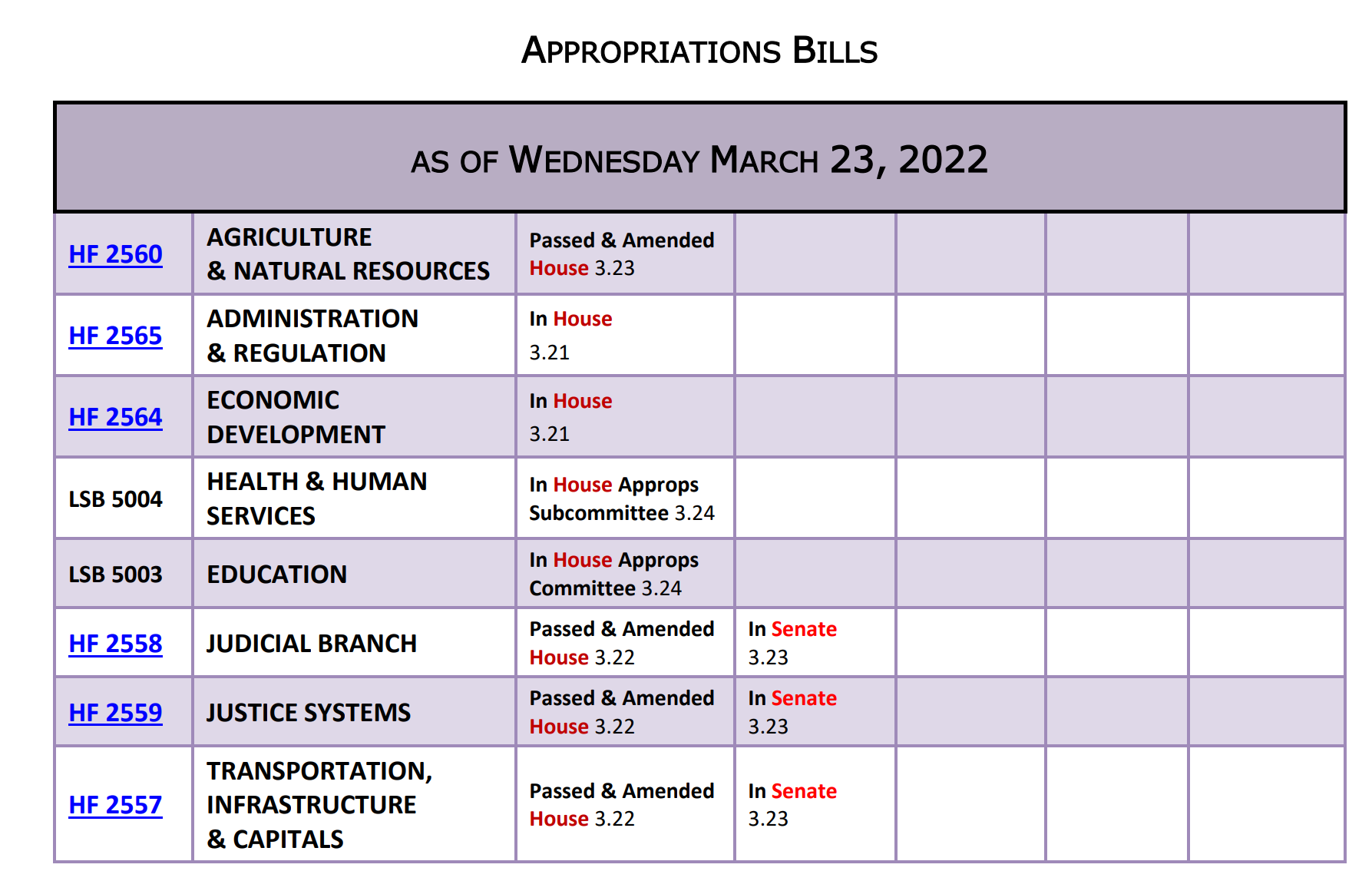
Some significant changes compared to FY 2022 Education Appropriations:
- Increases Teach Iowa Loan grants from $400,000 to $650,000
- New Mental Health Professionals Loan Repayment Program $1.5 million
- Adds $200,000 for Early Childhood Iowa Database
- Increases Jobs for America’s Graduates (JAG) from $4.66 million to $8.15 million (+$3.5 million)
- Increases children’s mental health training to $3,383,936 (+$200,000)
- Increases Therapeutic Classrooms to $1.67 M (+$40,000)
- Establishes a new Iowa Workforce Grant $15 million (up to $2,500 scholarship to individuals in studying for shortage area positions, including teachers and both traditional and new teacher intern credentials)
- 3% increase to Community Colleges
- 0 increase to Regents Universities
Approved on party lines in House Appropriations March 24, sending it to the House Calendar. When the bill has a number on the system, UEN will register as undecided.
Advocacy Actions This Week:
- Always start with a thank you! See the UEN 2021 Legislative Session Successes on the UEN website and find one you are grateful for them accomplishing. Weigh in your support on the bills above that are moving that might benefit your districts. Tell House members thank you for amending the mandatory reporter bill on the floor today.
- Transparency Provisions HF 2577: Thank House members for the reasonable amendments and for eliminating the high-stakes civics test for high school graduation.
- Voucher Opposition in the House: Continue to have little conversations with House legislators, but especially those on the House Appropriations Committee and reiterate key messages:
- Taxpayer dollars should not support private, religious schools.
- Public funds require public accountability and transparency.
- Private and public schools do not have a level playing field. If privates are to receive public money, they must have the same regulations and requirements (accept all students, comply with education policy mandates, open meetings, public records, student achievement testing and accountability).
- This is a slippery slope toward a costly an expansive voucher program.
- Iowa already has many parent choice options and financial support for private schools, scholarships and tax credits to help parents making that choice.
- The state has not been able to adequately fund one education system and should not commit to the hefty price tag of funding another.
- Funding: advocate with the Senate to approve HF 2315, which provides $19.2 million in supplemental funding to help schools with inflationary costs. Explain that federal pandemic funds are (pick the one or two that apply to your district): 1) already exhausted, 2) obligated but waiting for labor/materials/other supply chain issues that have slowed HVAC construction or simply no applicants for instructional positions, 3) local district must have the funds to expend first, and then seek reimbursement, which can take time to properly document and obtain approval and for all districts, the federal pandemic funds are to be used through Sept. 2024, but then are gone. Adequate state funding would provide sustainability for many of the programs districts have been able to fund with the pandemic funds, but only for a limited time.
Find Representatives here: https://www.legis.iowa.gov/legislators/house
Find Senators here: https://www.legis.iowa.gov/legislators/senate
Connecting with Legislators: To call and leave a message for a Senator, call the Senate switchboard operator number is 515.281.3371. To call and leave a message for a representative, the House switchboard operator number is 515.281-3221. You can ask if they are available or leave a message for them to call you back. You can also ask them what’s the best way to contact them during Session. They may tell you email, text message or phone call is the best way to connect with them during the Session, based on their personal preferences.
UEN Advocacy Resources: Check out the UEN Website at www.uen-ia.org to find Advocacy Resources such as Issue Briefs, UEN Weekly Legislative Reports and video updates, UEN Calls to Action when immediate advocacy action is required, testimony presented to the State Board of Education, the DE or any legislative committee or public hearing, and links to fiscal information that may inform your work. The latest legislative actions from the Statehouse will be posted at: www.uen-ia.org/blogs-list. See the 2022 UEN Advocacy Handbook, which is also available from the subscriber section of the UEN website.
Contact us with any questions, feedback or suggestions to better prepare your advocacy work:
Margaret Buckton
UEN Executive Director/Legislative Analyst
margaret@iowaschoolfinance.com
515.201.3755 Cell


